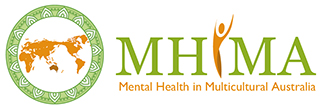MHIMA - FRAMEWORK FOR MENTAL HEALTH IN MULTICULTURAL AUSTRALIA: TOWARDS CULTURALLY INCLUSIVE SERVICE DELIVERY
ORGANISATIONS - IMPLEMENTATION GUIDE - Workforce
Australia needs a mental health workforce that is able to respond to the diversity of the population. We must develop an informed, skilled, flexible and reflective workforce with strong leadership in order to deliver successful strategies that improve access, quality of care and recovery services for CALD clients.
Standard 3 of the National Practice Standards for the Mental Health Workforce (2013) addresses 'awareness of diversity'. It articulates the knowledge, skills and attitudes required of the mental health workforce practicing in a diverse society. In order to provide clinically competent mental health care in a culturally diverse society, the workforce must go beyond being culturally aware, to being culturally responsive.
Clinicians and other staff responding to cultural and language diversity need to be:
- Flexible in their approach
- Able to adapt assessment processes and interventions to achieve equitable clinical outcomes across all population groups.
Cultural responsiveness needs to be integrated into clinical training programs in mental health and suicide prevention, as well as broader areas of engagement, and promotion and prevention activities. While the workforce require the knowledge, skills and awareness to provide of culturally responsive mental health care, services need to support them to undertake training and to provide a work environment where the training can be put into practice.
Cultural responsiveness must be applied at all the levels of service delivery, from individual treatment through to the broader system. As stated in the National Mental Health Workforce Strategy (NMHWS) (2011), ongoing cultural competency training, rather than brief awareness sessions, is the most appropriate strategy for building workforce capacity.
The Framework, in line with the NMHWS and the Fourth National Mental Health Plan (2009) views the 'mental health workforce', to include other government agencies, the primary care sector, non-government organisations, community agencies, interpreters, and others.
KEY OUTCOME AREA 4: WORKFORCE
A culturally responsive and diverse mental health workforce which is supported to deliver culturally and linguistically inclusive practice.
-
Outcome Indicator 4.1 Improved knowledge and skills in cultural responsiveness in the mental health workforce
Level Strategy
Good Practice Examples Referencing Entry The organisation accepts and respects the importance of cultural responsiveness skills in the mental health workforce. NSQHSS:
1.4Developing The organisation provides professional development or supports staff at all levels, to attend cultural competency training. Advanced The organisation engages in evaluation, research and development of culturally appropriate service delivery relevant to transcultural mental health. -
Outcome Indicator 4.2 Improved knowledge and skills about seeking specialist cultural assistance and input when required
Level Strategy
Good Practice Examples Referencing Entry The organisation accepts and respects the importance and benefits of seeking specialist cultural assistance and input when required. NSMHS:
4.4Developing The organisation has processes and networks in place to seek specialist cultural assistance and advice when required and engages with specialist transcultural mental health services. Advanced The organisation routinely seeks input from specialist transcultural mental health services and reviews and improves the effectiveness. -
Outcome Indicator 4.3 Improved skills in working with interpreters and adherence to language services policies in mental health
Level Strategy
Good Practice Examples Referencing Entry The organisation accepts and respects the importance of working with interpreters and adhering to a language services policy in mental health service delivery to CALD consumers and carers. NSMHS:
4.5Developing The organisation works with interpreters when required and adheres to a language services policy when working with CALD consumers and carers. Advanced The organisation regularly reviews and improves its language services policy and the effectiveness of their work with interpreters. -
Outcome indicator 4.4 Improved skills in working with translators and multicultural services in mental health
-
Outcome Indicator 4.5 Increased diversity of the professional mental health workforce which is representative of the ethnic and cultural groups in the community
Level Strategy
Good Practice Examples Referencing Entry The organisation accepts and respects the need to recruit and employ a diverse professional mental health workforce representative of the ethnic and cultural groups in their catchment area to meet the needs of the service. Developing The organisation recruits and employs a diverse professional mental health workforce representative of the ethnic and multicultural groups in the catchment area to meet the needs of the service. Advanced The organisation routinely evaluates its HRM/recruitment strategies to ensure its workforce is representative of the community it serves. -
Outcome Indicator 4.6 Improved retention of a culturally and linguistically diverse mental health workforce
Level Strategy
Good Practice Examples Referencing Entry The organisation accepts and respects the importance of retention of CALD staff. NSMHS:
4.6Developing The organisation has processes in place to retain a diverse professional workforce. Advanced The organisation regularly reviews and improves processes to effectively retain CALD staff. -
Outcome Indicator 4.7 Increased training of the multicultural sector workforce in mental health and suicide prevention
Previous Page
